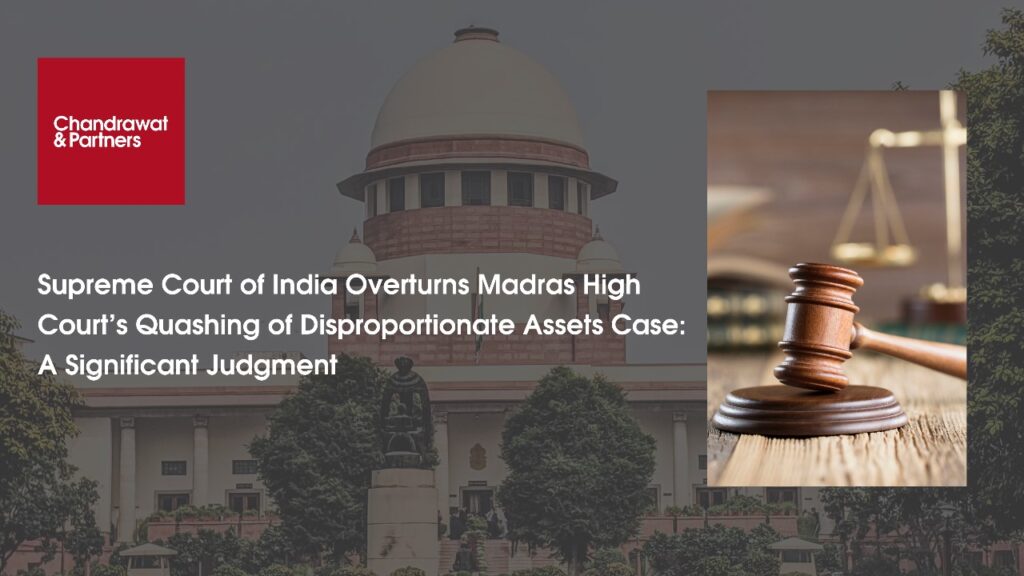Home > Recent Judgements > Supreme Court of India Overturns Madras High Court’s Quashing of Disproportionate Assets Case: A Significant Judgment
Mar 27, 2025
Supreme Court of India Overturns Madras High Court’s Quashing of Disproportionate Assets Case: A Significant Judgment
On March 26, 2025, the Supreme Court of India delivered a landmark judgment in a corruption-related case, highlighting its stance on the proper procedural conduct for handling criminal cases under the Prevention of Corruption Act, 1988. The judgment reversed a controversial decision by the Madras High Court that had quashed criminal proceedings against G. Easwaran, a former Assistant Director with the Nagercoil Local Planning Authority. Easwaran had been accused of possessing disproportionate assets, a charge punishable under the Prevention of Corruption Act, 1988.
Background of the Case
G. Easwaran was accused of accumulating assets disproportionate to his known sources of income. This led to a formal charge of corruption and an investigation under the Prevention of Corruption Act, 1988. However, the Madras High Court intervened in 2019 and quashed the criminal proceedings, ruling that the delay in obtaining sanction for prosecution was a violation of the legal procedures. The High Court further suggested that the assets in question could not be categorized as disproportionate, and as such, the prosecution should not proceed. This decision was a significant blow to the investigation, and it sparked controversy, given the serious nature of the charges against the public official.
Supreme Court’s Ruling
In its judgment, the Supreme Court of India strongly disagreed with the Madras High Court’s stance and reversed its decision. The Court held that the High Court should not have interfered at this stage, emphasizing that the validity of the sanction for prosecution should be addressed during the trial process, not dismissed prematurely under Section 482 of the Criminal Procedure Code (CrPC) for procedural delays or technical errors.
The Supreme Court made it clear that judicial intervention at the stage of quashing criminal proceedings was inappropriate unless there were glaring legal infirmities or instances of gross misuse of power. Instead, the Court upheld the importance of allowing a full and fair trial to examine the merits of the charges against the accused, particularly in cases involving serious allegations like corruption.
Legal Implications and Significance of the Judgment
This ruling by the Supreme Court is significant for several reasons:
- Preservation of the Integrity of the Trial Process: By overturning the High Court’s decision, the Supreme Court reiterated that legal processes must be followed diligently and that accusations of corruption should not be dismissed prematurely, especially when the matter concerns public servants. It emphasized the importance of allowing the trial to test the evidence rather than quashing proceedings based on minor procedural flaws.
- Judicial Oversight and Responsibility: The Supreme Court’s judgment also sends a message regarding the proper role of higher courts in cases of corruption. The Court underscored that it is not the role of the High Courts to weigh the sufficiency of evidence or investigate the merits of the case before the trial has even started. The appropriate stage for such examinations is during the trial process, where both the prosecution and defense can present their arguments.
- Strengthening Anti-Corruption Measures: This decision is seen as a victory for anti-corruption efforts in India. By ensuring that corruption cases involving public officials are not easily dismissed, the Supreme Court has reaffirmed the need for a robust legal system that holds public servants accountable for illegal enrichment and misconduct. It also underscores the importance of vigilance and transparency in the public sector, particularly in government planning and development authorities.
- Guidance for Future Legal Proceedings: The judgment serves as a guiding precedent for future cases involving accusations of disproportionate assets or corruption under the Prevention of Corruption Act. Courts will be more cautious about quashing such cases before trial and will likely adopt a more stringent approach in ensuring that all relevant legal procedures are followed and that such matters are examined comprehensively during the trial phase.
The Role of the Prevention of Corruption Act, 1988
The Prevention of Corruption Act, 1988, is a critical tool in India’s fight against corruption. The Act empowers authorities to investigate and prosecute public servants involved in corruption and the illegal accumulation of assets. Section 13(1)(e) of the Act specifically deals with the offense of disproportionate assets, making it an essential provision in tackling financial corruption among government officials.
The importance of this judgment lies in its reinforcement of the legal framework that ensures public servants are held accountable for actions that violate public trust. It emphasizes that even when there are procedural delays or errors, these should not automatically lead to the quashing of proceedings without a full trial.
Conclusion
The Supreme Court’s decision to overturn the Madras High Court’s order to quash the disproportionate assets case against G. Easwaran is a strong message about the importance of upholding legal processes in corruption cases. It reinforces the integrity of the trial system, ensuring that public servants accused of financial misconduct face a proper examination of the evidence in a court of law. This ruling is a vital step in ensuring that India’s fight against corruption remains steadfast and uncompromised.
As the case proceeds, it will serve as an important precedent for future legal battles involving allegations of corruption, ensuring that similar cases are dealt with in accordance with the law, and that justice is served for the public.
For more information or queries, please email us at
[email protected]





